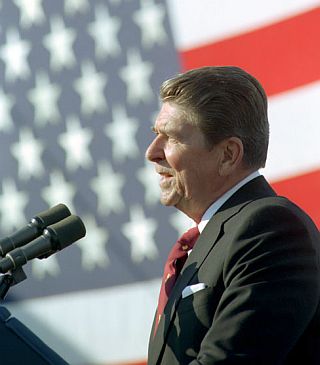
President Ronald Reagan speaking at the Reagan-Bush campaign rally in Hammonton, NJ, 19 September 1984.
Reagan was leading in the national polls at the time and had come to Hammonton, New Jersey for a Reagan-Bush campaign rally to give a campaign speech. Hammonton, known for its blueberry production, is located in southeastern New Jersey in Atlantic County, not far from Atlantic City.
The town had gone all out for Reagan’s visit, staged in an outdoor venue. Patriotic bunting decorated the buildings and a local band with cheerleaders was in place on the stage.
A giant American flag filled a large wall behind where Reagan would speak. And a large printed banner running along that wall offered a patriotic slogan that read: “America: Prouder, Stronger & Better.” A crowd of more than 30,000 had come out in Hammonton to hear Reagan, many of them waving hand-held American flags.
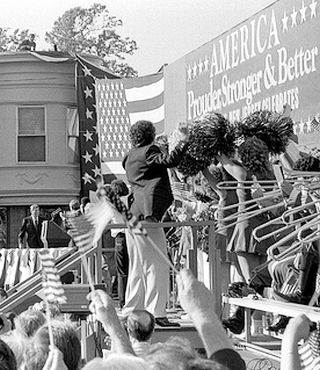
Ronald Reagan, barely visible in this photo, center left, approaching rostrum for 1984 speech at Hammonton, NJ, September 19th. Photo, PerOwer, flicker.com.
“America’s future rests in a thousand dreams inside your hearts,” President Reagan said in his speech. “It rests in the message of hope in songs so many young Americans admire: New Jersey’s own Bruce Springsteen. And helping you make those dreams come true is what this job of mine is all about.”
Bruce Springsteen at the time was about as popular as a rock ‘n roll singer could be, and it certainly wouldn’t hurt a politician – even an incumbent president – to be identified with that popularity. Springsteen then had a very successful album, Born in the U.S.A., with a popular song of the same name. The album had been released in June 1984 and was No.1 on the Billboard album chart by July 1984, remaining on the chart for 139 weeks. It would also spawn seven Top-10 hit singles and become one of the best-selling albums of Springsteen’s career with over 15 million copies sold in the U.S. alone. It was a monster hit, as was its title song, “Born in the U.S.A.” The release of the song as a single had followed the album. It was the third single from the album, and peaked at No.9 later that year on the Billboard Hot 100 singles chart.
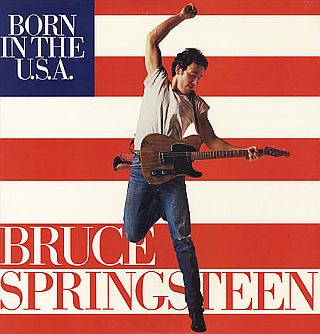
Cover of Bruce Springsteen’s 1984 single, “Born in The U.S.A.,” which rose into Billboard’s Top Ten. Click for digital single.
“I have not got a clue about Springsteen’s politics, if any, but flags get waved at his concerts while he sings songs about hard times. He is no whiner, and the recitation of closed factories and other problems always seems punctuated by a grand, cheerful affirmation: ‘Born in the U.S.A.!'”
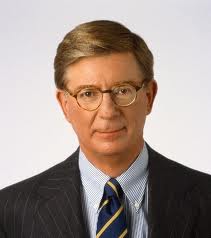
Washington Post columnist, George Will, took Bruce Springsteen’s rock music the wrong way. (see his full column at end).
The national campaign press, meanwhile, after hearing Reagan’s mention of Springsteen at Hammonton, were skeptical that Reagan knew anything at all about Springsteen or his music. Some asked what Reagan’s favorite Springsteen song was, for example. After a time, came the answer: “Born to Run.” Late night talk show host Johnny Carson began making jokes about Reagan’s new favorite music.
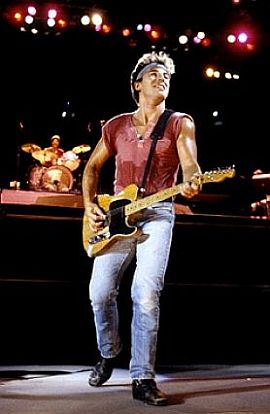
Bruce Springsteen performing in 1985.
Meanwhile, Democratic presidential challenger Walter Mondale would say sometime later while campaigning, “Bruce Springsteen may have been born to run but he wasn’t born yesterday,” referring to Reagan’s use of the Springsteen association. Mondale later claimed to have been endorsed by Springsteen. But Mondale, too, was off the mark. Springsteen manager, Jon Landau, denied any such endorsement, and the Mondale campaign issued a retraction.
Springsteen, in an interview with Rolling Stone magazine, had a bit more to say about Reagan:
“I think people have a need to feel good about the country they live in. But what’s happening, I think, is that that need — which is a good thing — is getting manipulated and exploited. You see it in the Reagan election ads on TV, you know, ‘It’s morning in America,’ and you say, ‘Well, it’s not morning in Pittsburgh.'”
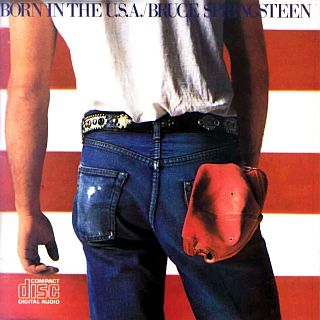
Cover of Bruce Springsteen’s “Born in the U.S.A.” album – No.1 on the Billboard chart in July 1984. Click for CD or digital.
Springsteen himself would later explain that the song is about a working-class man in the midst of a spiritual crisis, trying to find his way: “…It’s like he has nothing left to tie him into society anymore. He’s isolated from the government. Isolated from his family…to the point where nothing makes sense.”
At the time of George Will’s column, some who had read his thoughts on Springsteen’s music took exception to his interpretation, charging that he was trying to refashion Springsteen as a “hero of the right.” Yet there are strains of patriotic craving in the song. Some social scientists have scored “Born in the U.S.A.” as a lamentation on the loss of true national pride and a critique of a hollow patriotism – a cry for a patriotism that was once there but no longer exists.
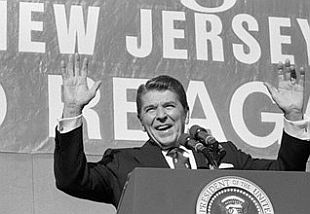
Sept 1984: President Ronald Reagan acknowledging the crowd at Hammonton, New Jersey. AP photo.
For other stories at this website on music and politics, see for example: “I’m A Dole Man,” “I Won’t Back Down,” and “Baracuda Politics.” Thanks for visiting — and if you like what you find here, please make a donation to help support the research and writing at this website. Thank you. – Jack Doyle.
|
Please Support Thank You |
____________________________________
Date Posted: 14 April 2012
Last Update: 10 April 2019
Comments to: jdoyle@pophistorydig.com
Article Citation:
Jack Doyle, “Reagan & Springsteen, 1984,”
PopHistoryDig.com, April 14, 2012.
____________________________________
Sources, Links & Additional Information
|
“Born in The U.S.A.” Born down in a dead man’s town Born in the U.S.A. Got in a little hometown jam Born in the U.S.A. Come back home to the refinery He had a woman he loved in Saigon Down in the shadow of the penitentiary Born in the U.S.A. I was born in the U.S.A. |
“Born in the U.S.A. (song),” Wikipedia.org.
“Bruce Springsteen,” Wikipedia.org.
Bernard Goldberg, “Bruce Springsteen,” CBS Evening News, September 12, 1984.
George Will, “A Yankee Doodle Springsteen,” Washington Post, September 13, 1984.
George F. Will, “Bruce Springsteen’s U.S.A.,” Washington Post, Thursday, September 13, 1984, p. A-19.
Ron Collins, “A Curious Piece,” Washington Post, September 17, 1984, p. A-14.
Nora Leyland, “Will on Springsteen (Cont’d.),” Washington Post, September 19, 1984, p. A-26.
Francis X. Clines, “President Heaps Praise on Voters in the Northeast,” New York Times, Thursday, September 20, 1984, p. B-20.
Francis X. Clines, “Mondale Assails Reagan on Arms,” New York Times, Tuesday, October 2, 1984, p. A-22.
Joseph F. Sullivan, “Politics; Rally in Middlesex Lifts Mondale Spirits,”New York Times, Sunday, October 7, 1984, Section 11, p. 1.
Robert Palmer, “What Pop Lyrics Say to Us Today,” New York Times, Sunday, February 24, 1985.
Jon Pareles, “Bruce Springsteen – Rock’s Popular Populist,” New York Times, August 18, 1985.
Nicole Colson, “Sing a Song of Hypocrisy; Do the Political Candidates Pick the Songs That Fit Them?,” SocialistWorker.org, March 28, 2008, Issue 667.
Todd Leopold, “Analysis: The Age of Reagan, President Loomed over the ’80s, an Era at Odds with Itself,” CNN.com, June 16, 2004.
Jeff Vrabel, “1984 Bruce Springsteen: “Born in The U.S.A,” PopMatters Picks: Say It Loud! 65 Great Protest Songs, Pop Matters.com, July 19, 2007.
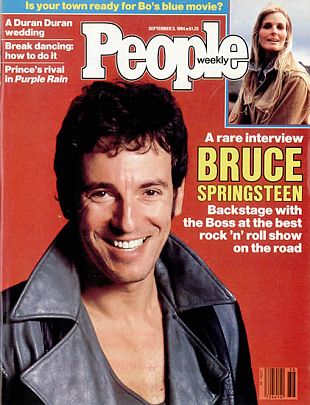
Bruce Springsteen on the cover of People magazine in September 1984, about the time of President Ronald Reagan’s remarks about him in Hammonton, NJ. Click for copy.
Jack Sanders, “Springsteen, Walmart, Populism &Republicans,” IssueOriented.com March 19, 2009.
Jefferson R. Cowie and Lauren Boehm, “Dead Man’s Town: ‘Born in the U.S.A.,’ Social History, and Working-Class Identity,” American Quarterly – Volume 58, Number 2, June 2006, pp. 353-378.
“America’s Future Rests in a Thousand Dreams Inside Your Hearts,” September 19, 1984 speech of President Ronald Reagan at Hammonton, New Jersey, formerly displayed at My Hammonton.com, since removed.
Associated Press, “Music and Candidates: An Uneasy Alliance,” KLEW-TV.com, May 29, 2008, updated, November 20, 2008.
John Perich, “Born In The USA: Our Most Misappropriated Patriotic Song?,” Over ThinkingIt.com, July 3, 2009.
Randall E. Auxier and Doug Anderson (eds.), Bruce Sprinsteen and Philosophy: Darkness on the Edge of Truth, Open Court Books, 2008.
Rob Kirkpatrick, The Words and Music of Bruce Springsteen, Greenwood Publishing Group, 2007,198 pp.
“Ronald Reagan Rock,” Hammonton, New Jersey, RoadsideAmerica.com.
|
“Bruce Springsteen, U.S.A” What I did on my summer vacation: My friend Bruce Springsteen…Okay, he’s only my acquaintance, but my children now think I am a serious person. I met him because his colleague Max Weinberg and Max’s wife Rebecca invited me to enjoy Max’s work, which I did. He plays drums for Springsteen, who plays rock and roll for purists, of whom there are lots. For 10 shows in New Jersey, he recently sold 16,000 $16 tickets in the first hour, all 202,000 in a day. His albums can sell 1 million copies on the first day of release. There is not a smidgen of androgyny in Springsteen, who, rocketing around the stage in a T-shirt and headband, resembles Robert DeNiro in the combat scenes of “The Deerhunter.” This is rock for the United Steelworkers, accompanied by the opening barrage the battle of the Somme. The saintly Rebecca met me with a small pouch of cotton — for my ears, she explained. She thinks I am a poor specimen, I thought. I made it three beats into the first number before packing my ears. I may be the only 43-year-old American so out of the swim that I do not even know what marijuana smoke smells like. Perhaps at the concert I was surrounded by controlled substances. Certainly I was surrounded by orderly young adults earnestly — and correctly — insisting that Springsteen is a wholesome cultural portent. For the uninitiated, the sensory blitzkrieg of a Springsteen concert is stunning. For the initiated, which included most of the 20,000 the night I experienced him, the lyrics, believe it or not, are most important. Today, “values” are all the rage, with political candidates claiming to have backpacks stuffed full of them. Springsteen’s fans say his message affirms the right values. Certainly his manner does. Many of his fans regarded me as exotic fauna at the concert (a bow tie and double-breasted blazer is not the dress code) and undertook to instruct me. A typical tutorial went like this: Me: “What do you like about him?” Let’s not quibble. Cars and girls are American values, and this lyric surely expresses some elemental American sentiment: “Now mister the day my number comes in I ain’t never gonna ride in no used car again.” Springsteen, a product of industrial New Jersey, is called the “blue-collar troubadour.” But if this is the class struggle, its anthem — its “Internationale” — is the song that provides the title for his 18-month, worldwide tour: “Born in the U.S.A.” I have not got a clue about Springsteen’s politics, if any, but flags get waved at his concerts while he sings songs about hard times. He is no whiner, and the recitation of closed factories and other problems always seems punctuated by a grand, cheerful affirmation: “Born in the U.S.A.!” His songs, and the engaging homilies with which he introduces them, tell listeners to “downsize” their expectations — his phrase, borrowed from the auto industry, naturally. It is music for saying good-bye to Peter Pan: Life is real, life is earnest, life is a lot of work, but . . . “Friday night’s pay night, guys fresh out of work/Talking about the weekend, scrubbing off the dirt. . ./In my head I keep a picture of a pretty little miss/Someday mister I’m gonna lead a better life than this.” An evening with Springsteen — an evening tends to wash over into the a.m., the concerts lasting four hours — is vivid proof that the work ethic is alive and well. Backstage there hovers the odor of Ben-Gay: Springsteen is an athlete draining himself for every audience. But, then, consider Max Weinberg’s bandaged fingers. The rigors of drumming have led to five tendinitis operations. He soaks his hands in hot water before a concert, in ice afterward, and sleeps with tight gloves on. Yes, of course, the whole E Street Band is making enough money to ease the pain. But they are not charging as much as they could, and the customers are happy. How many American businesses can say that? If all Americans — in labor and management, who make steel or cars or shoes or textiles — made their products with as much energy and confidence as Springsteen and his merry band make music, there would be no need for Congress to be thinking about protectionism. No “domestic content” legislation is needed in the music industry. The British and other invasions have been met and matched. In an age of lackadaisical effort and slipshod products, anyone who does anything — anything legal — conspicuously well and with zest is a national asset. Springsteen’s tour is hard, honest work and evidence of the astonishing vitality of America’s regions and generations. They produce distinctive tones of voice that other regions and generations embrace. There still is nothing quite like being born in the U.S.A. ______________ |